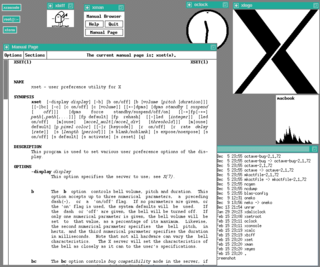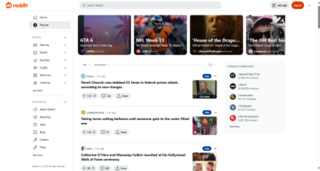This article is being considered for deletion in accordance with Wikipedia's deletion policy. Please share your thoughts on the matter at this article's entry on the Articles for deletion page. Feel free to improve the article, but the article must not be blanked, and this notice must not be removed, until the discussion is closed. For more information, particularly on merging or moving the article during the discussion, read the guide to deletion. |
 | |
 | |
| Original author(s) | Thorsten Wißmann |
|---|---|
| Initial release | 3 October 2011 |
| Stable release | 0.7.0 / 4 February 2016 [1] |
| Repository | github |
| Written in | C++ |
| Operating system | Unix-like |
| Platform | IA-32, x86-64 |
| Size | 549 k |
| Available in | English |
| Type | Window manager |
| License | Simplified BSD [2] |
| Website | herbstluftwm |
herbstluftwm (abbreviated ashlwm, from German : herbstluft"autumn air" [3] ) is a manual tiling window manager for X11 display manager on Linux operating system and its derivatives. It uses Xlib and GLib [4] system libraries, and is designed in a similar fashion to other minimalistic tiling window managers such as i3 and Musca intended to be configured manually by the user through configuration files using imperative directives. [5] hlwm supports workspaces in which individual windows can reside. It also supports multiple displays or computer monitors. It was first released in 2011 and is now in its 0.7 version as of the latest 2016 release being maintained on GitHub.

German is a West Germanic language that is mainly spoken in Central Europe. It is the most widely spoken and official or co-official language in Germany, Austria, Switzerland, South Tyrol (Italy), the German-speaking Community of Belgium, and Liechtenstein. It is also one of the three official languages of Luxembourg and a co-official language in the Opole Voivodeship in Poland. The languages which are most similar to German are the other members of the West Germanic language branch: Afrikaans, Dutch, English, the Frisian languages, Low German/Low Saxon, Luxembourgish, and Yiddish. There are also strong similarities in vocabulary with Danish, Norwegian and Swedish, although those belong to the North Germanic group. German is the second most widely spoken Germanic language, after English.

In computing, a tiling window manager is a window manager with an organization of the screen into mutually non-overlapping frames, as opposed to the more popular approach of coordinate-based stacking of overlapping objects (windows) that tries to fully emulate the desktop metaphor.

Linux is a family of free and open-source software operating systems based on the Linux kernel, an operating system kernel first released on September 17, 1991 by Linus Torvalds. Linux is typically packaged in a Linux distribution.
Contents
It is free and open-source software distributed under the simplified BSD license.

Free and open-source software (FOSS) is software that can be classified as both free software and open-source software. That is, anyone is freely licensed to use, copy, study, and change the software in any way, and the source code is openly shared so that people are encouraged to voluntarily improve the design of the software. This is in contrast to proprietary software, where the software is under restrictive copyright licensing and the source code is usually hidden from the users.
BSD licenses are a family of permissive free software licenses, imposing minimal restrictions on the use and distribution of covered software. This is in contrast to copyleft licenses, which have share-alike requirements. The original BSD license was used for its namesake, the Berkeley Software Distribution (BSD), a Unix-like operating system. The original version has since been revised, and its descendants are referred to as modified BSD licenses.



